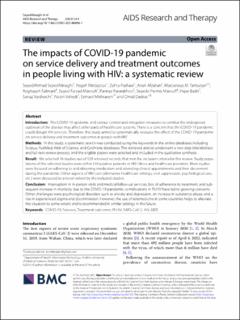| dc.contributor.author | SeyedAlinaghi, SeyedAhmad | |
| dc.contributor.author | Mirzapour, Pegah | |
| dc.contributor.author | Pashaei, Zahra | |
| dc.contributor.author | Afzalian, Arian | |
| dc.contributor.author | Tantuoyir, Marcarious M. | |
| dc.contributor.author | Salmani, Roghayeh | |
| dc.contributor.author | Maroufi, Seyed Farzad | |
| dc.contributor.author | Paranjkhoo, Parinaz | |
| dc.contributor.author | Maroufi, Seyede Parmis | |
| dc.contributor.author | Badri, Hajar | |
| dc.contributor.author | Varshochi, Sanaz | |
| dc.contributor.author | Vahedi, Farzin | |
| dc.contributor.author | Mehraeen, Esmaeil | |
| dc.contributor.author | Dadras, Omid | |
| dc.date.accessioned | 2024-04-03T12:34:43Z | |
| dc.date.available | 2024-04-03T12:34:43Z | |
| dc.date.created | 2023-03-29T10:52:51Z | |
| dc.date.issued | 2023 | |
| dc.identifier.issn | 1742-6405 | |
| dc.identifier.uri | https://hdl.handle.net/11250/3124680 | |
| dc.description.abstract | Introduction
The COVID-19 epidemic and various control and mitigation measures to combat the widespread outbreak of the disease may affect other parts of health care systems. There is a concern that the COVID-19 pandemic could disrupt HIV services. Therefore, this study aimed to systematically evaluate the effect of the COVID-19 pandemic on service delivery and treatment outcomes in people with HIV.
Methods
In this study, a systematic search was conducted using the keywords in the online databases including Scopus, PubMed, Web of Science, and Cochrane databases. The retrieved articles underwent a two-step title/abstract and full-text review process, and the eligible papers were selected and included in the qualitative synthesis.
Result
We selected 16 studies out of 529 retrieved records that met the inclusion criteria for this review. Study populations of the selected studies were either HIV-positive patients or HIV clinics and healthcare providers. Most studies were focused on adhering to and obtaining medication and attending clinical appointments and their decrement during the pandemic. Other aspects of HIV care (alternative healthcare settings, viral suppression, psychological care, etc.) were discussed to a lesser extent by the included studies.
Conclusion
Interruption in in-person visits and medical follow-up services, loss of adherence to treatment, and subsequent increase in mortality due to the COVID-19 pandemic complications in PLHIV have led to growing concerns. Other challenges were psychological disorders such as anxiety and depression, an increase in substance abuse, and a rise in experienced stigma and discrimination. However, the use of telemedicine in some countries helps to alleviate the situation to some extent and is recommended in similar settings in the future. | en_US |
| dc.language.iso | eng | en_US |
| dc.publisher | BMC | en_US |
| dc.rights | Navngivelse 4.0 Internasjonal | * |
| dc.rights.uri | http://creativecommons.org/licenses/by/4.0/deed.no | * |
| dc.title | The impacts of COVID-19 pandemic on service delivery and treatment outcomes in people living with HIV: a systematic review | en_US |
| dc.type | Journal article | en_US |
| dc.type | Peer reviewed | en_US |
| dc.description.version | publishedVersion | en_US |
| dc.rights.holder | Copyright 2022 The Author(s) | en_US |
| dc.source.articlenumber | 4 | en_US |
| cristin.ispublished | true | |
| cristin.fulltext | original | |
| cristin.qualitycode | 1 | |
| dc.identifier.doi | 10.1186/s12981-022-00496-7 | |
| dc.identifier.cristin | 2137989 | |
| dc.source.journal | AIDS research and therapy | en_US |
| dc.identifier.citation | AIDS research and therapy. 2023, 20 (1), 4. | en_US |
| dc.source.volume | 20 | en_US |
| dc.source.issue | 1 | en_US |

